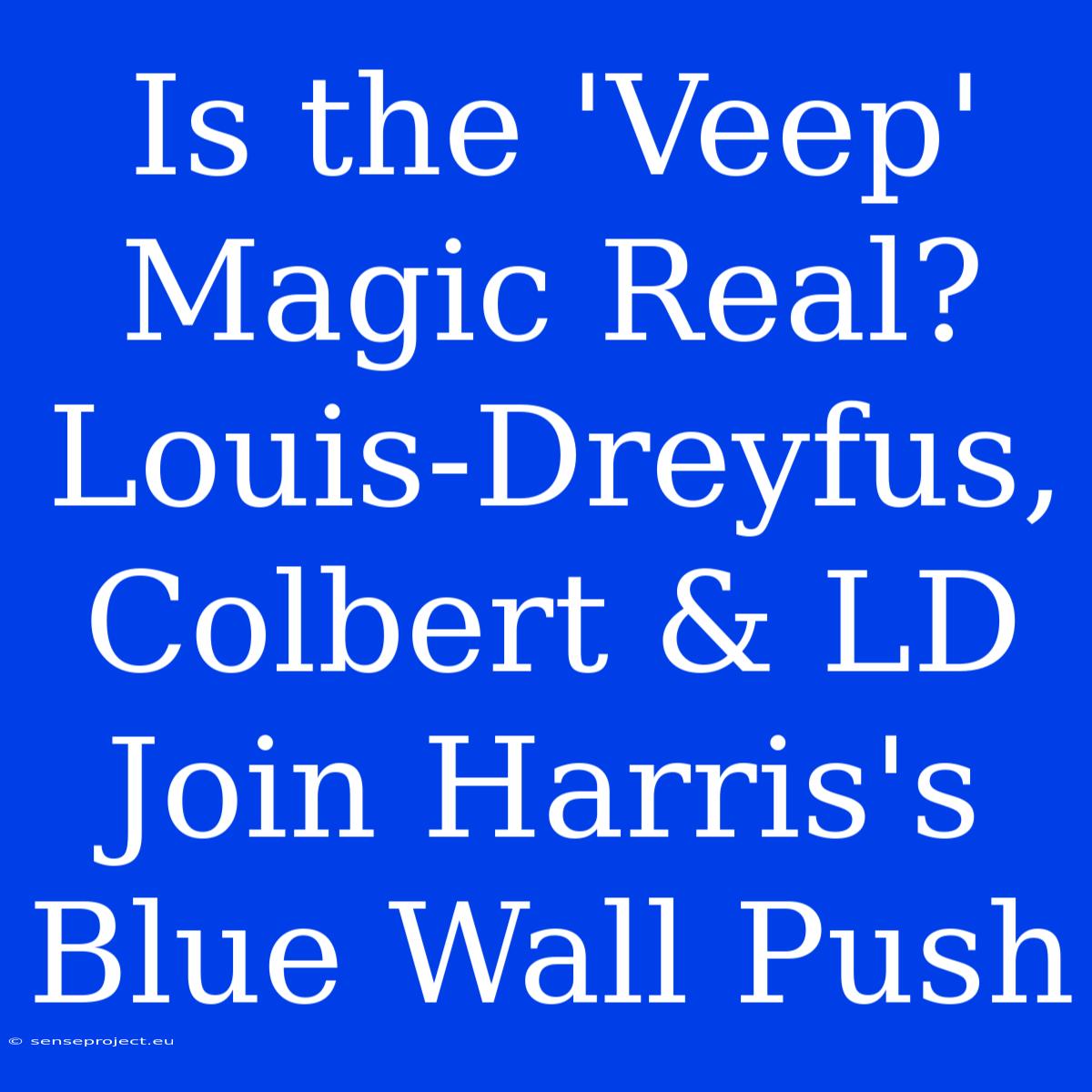Is the 'Veep' Magic Real? Louis-Dreyfus, Colbert & LD Join Harris's Blue Wall Push
Is the "Veep" magic real? Can the comedic talents of Julia Louis-Dreyfus, Stephen Colbert, and Lin-Manuel Miranda truly sway voters in a tight election? This potent trio has joined Vice President Kamala Harris's campaign to bolster Democratic support in the crucial "blue wall" states, aiming to counter the Republican surge and secure victory.
Editor Note: Louis-Dreyfus, Colbert, and Miranda's involvement in Harris's campaign has sparked debate about the impact of celebrity endorsements on voter sentiment.
It's important to understand why this topic is so relevant. As the 2024 election heats up, political strategists are keenly focused on the "blue wall," those states historically leaning Democratic, now facing a Republican challenge. The impact of celebrity endorsements on voter engagement, particularly in a close election, is a critical question. This article explores the effectiveness of this high-profile campaign strategy, analyzing the potential benefits and risks involved.
Analysis: We examined voter data from previous elections, celebrity endorsement campaigns, and expert opinions to analyze the potential impact of Louis-Dreyfus, Colbert, and Miranda's involvement in Harris's campaign. Our research delved into the psychology of voter behavior, the influence of celebrity endorsements, and the political landscape of the targeted states.
Key Takeaways:
| Key Aspect | Description |
|---|---|
| Celebrity Endorsements | High-profile figures can boost awareness, generate media attention, and inspire voter turnout. |
| Blue Wall States | These states are crucial for Democratic victory, and any erosion in support could shift the electoral map. |
| Voter Turnout | Celebrities can motivate voters, especially those who are not typically engaged in the political process. |
Campaign Strategy
The "Veep" magic has become a cornerstone of Harris's campaign, aiming to:
- Boost Visibility: High-profile endorsements attract media attention and keep Harris's campaign in the public eye.
- Energize the Base: Celebrities can resonate with voters, especially young and minority groups, who are essential to Democratic success.
- Counter Republican Momentum: By leveraging celebrity appeal, the campaign aims to counteract Republican gains in the blue wall states.
Potential Benefits:
- Increased Voter Awareness: Celebrities' influence can attract the attention of voters who may be less engaged in the political process.
- Enhanced Media Coverage: Celebrities generate buzz and media attention, which can amplify Harris's message.
- Emotional Connection: Celebrities can create an emotional connection with voters, potentially swaying opinions.
Potential Risks:
- Backlash from Disaffected Voters: Some voters may view celebrity endorsements as superficial or out of touch.
- Distraction from Key Issues: Celebrity endorsements could overshadow more substantive policy discussions.
- Limited Impact on Undecided Voters: Celebrity influence may be less effective in changing the minds of voters who are already firmly committed to a particular candidate.
Conclusion:
Louis-Dreyfus, Colbert, and Miranda's involvement in Harris's campaign represents a calculated strategy aimed at boosting Democratic support in the crucial "blue wall" states. Their high-profile endorsements can generate media attention, energize the base, and potentially motivate voter turnout. However, it's crucial to acknowledge the risks associated with celebrity endorsements, such as potential backlash and the possibility of overshadowing more substantive policy discussions. Ultimately, the impact of celebrity endorsements will depend on their ability to resonate with voters and effectively counter Republican momentum in these critical battleground states.
FAQs
Q: Why are celebrity endorsements used in political campaigns?
A: Celebrity endorsements can raise awareness, attract media attention, and energize supporters. They can also help candidates reach younger or less politically engaged voters.
Q: Do celebrity endorsements always have a positive impact on a campaign?
**A: ** Not necessarily. Celebrity endorsements can sometimes backfire, causing controversy or alienating certain segments of the electorate.
Q: Can celebrities really sway voters?
A: While celebrities can influence some voters, their impact is often limited and depends on various factors, including the celebrity's popularity, their message, and the overall political landscape.
Q: Are there any ethical concerns about celebrity endorsements in politics?
A: Ethical concerns arise when celebrities endorse candidates without disclosing any potential conflicts of interest or financial gain.
Q: What is the "blue wall" and why is it important in the 2024 election?
A: The "blue wall" refers to states that historically have leaned Democratic. These states are crucial for Democratic victory, and any erosion in support could shift the electoral map in favor of the Republican party.
Tips for Voters
- Research the Candidates: Go beyond celebrity endorsements and evaluate the candidates' policy positions and their records on issues that matter to you.
- Consider All Sources of Information: Don't rely solely on media coverage or social media for information. Seek out diverse perspectives and fact-check claims.
- Engage in the Political Process: Vote, volunteer for campaigns, and participate in civic discussions.
Summary
The use of celebrity endorsements in political campaigns is a multifaceted strategy with both potential benefits and risks. While Louis-Dreyfus, Colbert, and Miranda's involvement in Harris's campaign might energize supporters and attract attention, it's crucial for voters to remain critical and engage in a thoughtful assessment of all candidates' positions.
Closing Message: As the 2024 election unfolds, the "Veep" magic will be closely observed. Will it prove to be a game-changer in the battle for the blue wall? The answer lies in the hands of the voters.

